Transcription
True Prison Reform
Change Begins With Us
Many of us are frustrated and fed-up with the failures, abuses, and incompetence of the current system of incarceration - and we should be. Most prisons are nothing more than human storage facilities that offer little to no support for rehabilitation. The programs that are offered are ineffective and way out of touch with the latest research in criminal rehabilitation and psychology. We spend years in an environment that teaches us how to be angry, lazy, and violent, an environment that is cold, indifferent, and extremely dysfunctional, then, if we are lucky enough, we are released into the world and expected to live as healthy, productive citizens. The model is absurd and an insult to 21st century civilization. Our communities, our families, and those of us who have to live in this insanity deserve better than this. Without a prison system that is based on rehabilitation and humane treatment how are we going to make our communities safer?
So what would a fair, humane, and rehabilitative prison system look like? There are far too many issues to address here, but here's a good start: The focus would be on rehabilitation. The prison staff and administration would model the values and behaviors expected of the residents. Programs would implement research backed curriculums. For example: Edward J. Latessa, Ph.D. and Christopher Lowenkamp, Ph.D. professor and head professor of Criminal Justice at the University of Cincinnati reviewed volumes of research and came up with six factors they call "Criminogenic Needs" - these factors are present in those who are most likely to re-offend. Studies have shown that when at least four of the six are addressed recidivism is reduced by 30%.
The six factors include:
-Antisocial/pro-criminal attitudes, values, and beliefs
-Pro-criminal associates
-Temperament and personality factors
-A history of antisocial behavior
-Family factors
-Low levels of education, vocational, or financial achievement
Studies show that programs that don't address at least four of the above issues have little to no effect on recidivism.
In addition, the MBA Project (Mind Body Awareness) - an organization that works with at risk populations - has created a program that has amazing results.
This program teaches participants:
1. Basic Goodness
2. Mindfulness Skills
3. Active Listening
4. Impulse Control
5. Emotional Intelligence
6. Empathy
7. Forgiveness
8. Transforming Negative Core Beliefs
9. Cause and Effect
10. Interpersonal Relationship Skills
To find out more, visit their website at: mbaproject.org
If an inmate like myself with only a 10th grade education can find and apply the most effective skills in criminal rehabilitation, it should be no problem for the D.O.C. to learn about them and implement them in their programs
This in combination with better healthcare, healthier meal options, internet access, and dropping the "punishment" model (a model proven to be ineffective) would be a great place to begin bringing the prison system into the 21st century. But if we want true, lasting changes to occur in the way prisons are run we will need the support of the voting public and those who financially support our politicians. In order to gain this we must change the way the public views us. We will return to this subject after taking a look at what we can do today to create changes within the prison system.
It is obvious that the criminal justice system needs an overhaul, and it is also true that the number one factor that creates our experience of prison is our own attitudes and behaviors and the attitudes and behaviors of those we live with. This is true for any community. How we carry ourselves, how we treat each other and our attitudes are the largest factors that set the tone of our prison environments. This is a fact that we all too easily overlook.
The fact that we are the most powerful force creating the prison experience is good news. Why? Because this is the one factor we have full control over. We decide how we will behave and what our values and attitudes will be. This being true, it only makes sense that before we ask for better treatment we need to treat each other better. There are two reasons why this is crucial. One is: How we treat each other has the most impact on the health, tone, and general atmosphere of the prison environment. Second is; this is crucial, because if we expect the D.O.C. to raise their standards for how they treat ys, we need to raise our own standards. If we act like animals we should expect to be treated like animals - and the truth is we really do behave and treat each other like animals. This is unacceptable, and it is the main source of our problems. Before we blame others for prison conditions (and the D.O.C. has a lot to answer for) we need to take a good look at ourselves.
Sure, it's true that if we were treated better we would likely treat ourselves and each other better. But it is a copout to use that excuse. The truth is, the D.O.C. could say the same thing: "if you want better treatment you need to behave better." Both sides are equally in the right to say this. Throughout history in cases like this it has always been the job of the ones seeking better treatment to take responsibility for making those changes happen. If we want better treatment we need to become the kind of men people will want to help. This is absolutely necessary. We need to take responsibility for the fact that it is we ourselves who are the largest contributing factors in creating the prison tone and atmosphere. As long as we choose to ignore this fact, as long as we keep blaming others, we give up our greatest power to create change.
When Gandhi began his effort to free India from British rule he didn't start by demanding better treatment from the Brits. Instead he started with the Indians themselves. He told them that if they wanted better treatment, then they had to raise their own standard of living. At the time many Indian villages had terrible sanitation habits. Gandhi said that if they continued to live like animals they could be expected to be treated like animals. Gandhi then sent trained people into the villages to teach the residents how to live by healthier sanitation habits. Only then did Gandhi begin his effort to persuade the British politicians. If such a method was able to overthrow an empire without the use of violence, then maybe we could learn a little something from it.
So how do we raise our standards of living and start becoming the kind of men people would want to help? How do we ourselves create a more humane, respectable, and united prison environment? These are the kind of questions we need to consider if we hope to create true prison reform.
A good place is to evaluate our current standards of living, both on an individual basis and as a whole. If we are honest, the prison culture of today is pathetic. We are divided, violent, impulsive, self-obsessed, hateful, negative, needy, and we refuse to take responsibility for ourselves. Most of us have poor coping skills, poor emotional skills, and poor interpersonal skills. It is as if we are stuck as dysfunctional juvenile delinquents - and some of us are even proud of that fact. This may not be true for you, but if you take a look around it's a sad fact of life. As we are now, who would want to help us?
To begin a truly profound process of prison reform we need to unify ourselves. Great leaders and war generals have always known that the easiest way to conquer and control people is to divide them. As long as we remain divided we have little hope of creating the changes we seek, and we will remain easily controlled. The ability to work together and to look out for each other is the trademark of any successful movement. Unity is essential. How can we expect others to treat us better than we are willing to treat ourselves and each other?
We also need to raise our standard for what it means to be a stand-up person in prison. Our current model is the "solid con" standard. The truth is, this standard is pathetic. Think about it. You can be a "solid con" even if you don't care that you sell drugs to kids, prostitute women (many underage), rob your family and friends, rob the elderly, murder people, continually re-offend without remorse, and lead a life without morals and values. "Solid con" status is so cheap you can even buy it with a little canteen every week (if you've been around long enough you know it's true). This is absolutely pathetic. If our model for what it means to be a stand up guy allows for such a lack of character how can we expect others to care about what happens to us?
It isn't that there is anything wrong with calling yourself a "solid con", it's that the standards for what a "solid con" is are far too low. To raise ourselves up we need to raise our personal standards.
So Let's drop the "solid con" standard and replace it with the "real man" standard. Rather than ask if someone is a "solid con," we can ask, "Is he a real man?"
1. A real man, if he is guilty of his crimes, owns up to what he has done and feels sincere remorse for the pain he has caused.
2. A real man commits himself to the work of personal transformation so he never repeats the kind of behavior that landed him in prison.
3. A real man treats everyone, including himself, with human decency and respect. If he finds someone for whom he can't do this, he avoids that person and chooses not to interact with him.
4. A real man contributes to the safety and well being of his community - whether that is in prison or on the street.
5. A real man does his best to lead a life that reflects his deepest values.
6. A real man is willing to admit when he is wrong.
7. A real man tries his best to use his intelligence to resolve conflicts. He resorts to violence only when his life, or someone else's life is in danger and all other methods have failed.
8. A real man looks out for the welfare of others, especially those less fortunate, or weaker than he is.
9. A real man does not judge others on the worst behavior of their past, but judges them on how they are living their lives today.
10. A real man is willing to do "the right thing" even when he is afraid to do so.
Who can argue that the real man standard is not far more valuable than the "solid con" standard? Just imagine the differences we would experience if the real man standard was the norm in prison. If this was the standard we held each other to that would greatly improve the prison environment and our own image. Not only that, it would greatly improve our own lives. What kind of person would you be if you held yourself to the real man standard?
The time for using excuses has passed, it's now time that we man-up and take responsibility for creating true prison reform, and that reform must begin with us.
So, how will we start the process of creating new laws and bills for a more humane and effective prison system? The first step is to change the public's opinion of us. It is the voting public and its financial support that most heavily influences politicians and lobbyists. Once the public takes a sincere interest in improving the prison system that's when - as if by magic - the politicians will start lobbying for prison reform.
Right now the public gets most of its information concerning prisoners and those recently released from prison from the news media. This source is known for its intense focus on the negative. All the public hears about is brutality, heartless schemers, re-offenders, and senseless violence. Of course their opinion of us is bad! We are seen as less than human, worthless, and evil. With such a view of us the public finds no problem saying, "They get what they deserve!"
Luckily, we live in the age of the internet. It was through the internet that countries like Egypt, Libya, and Tunisia were able to create revolutions that overthrew their corrupt governments. But maybe you're thinking "That's all well and good, but we don't have internet access." If that is your thought then I have some great news for you. An organization called "Between the Bars" offers inmates free and unlimited blog space on the internet. What's a blog? A blog can be whatever you want it to be. It's a web-page of your own where you can upload anything you want. Essays, commentaries, artwork, poetry, lyrics, or even create your own newsletter. It's a place where you can share your thoughts and ideas. Never before have inmates had such a powerful way to affect public opinion. Just imagine the possibilities!
Imagine if we created a newsletter aimed at giving the public another, more humane view of us. We could feature stories about inmates or those recently released from prison who are leading inspiring lives. We could feature articles on men who are facing tremendous obstacles and are doing their best to overcome them in a system that doesn't support them or provide the help they need. We could report on the worst abuses of the system and its effects on inmates. Such stories would humanize us and create the public sympathy we need to create change.
Have your family e-mail the blog address to friends, put it up on facebook, and e-mail it to local and national media sources. Also, have them e-mail the address to politicians - do whatever you can to get it out there so the public can start hearing our side of the story. This is crucial!
If we don't take advantage of the free and unlimited blog space we are provided then the public will be right when they say we get what we deserve. This is our most powerful tool for getting the truth out and changing public opinion, and when public opinion changes that's when the way our prisons are run will change. To be apart of this program write:
Between the Bars
P.O.B. #425103
Cambridge, MA 02142
But the most impactful change we can make is one we can do ourselves: Drop the "solid con" standard and adopt the real man standard. Become a real man and hold others to this standard. By doing this we will create the most powerful and profound changes in the prison environment possible. We will also transform our own lives for the better. A prison population that uses this standard will gain the respect of the public and the politicians that create the laws that run our prisons.
This opportunity is yours, it is here, and it is now. Adopt the real mean standard and start a blog today. By doing this you will join the movement that is going to create true prison reform once and for all, and you're going to change your own life for the better. Make your time in prison count!
If this is a message you think people should hear make copies of it, pass them out, and spread the word! This is the way true change takes place:
"Never doubt that a small group of committed humans can change the world. It's the only thing that ever has."
Margaret Mead
Be a part of it!!
If you feel this message should be heard by inmates in other prisons please print this out and send it to any prison pen-pals you may have.
What I am doing is giving a speech in the different programs we have here. After each speech I pass out what you just read. We can really start a great movement. Please help spread the word.
Thank you! :)
Other posts by this author
|
2016 aug 4

|
2016 jun 25

|
2016 jun 9

|
2016 may 5

|
2016 mar 11

|
2016 feb 7

|
More... |

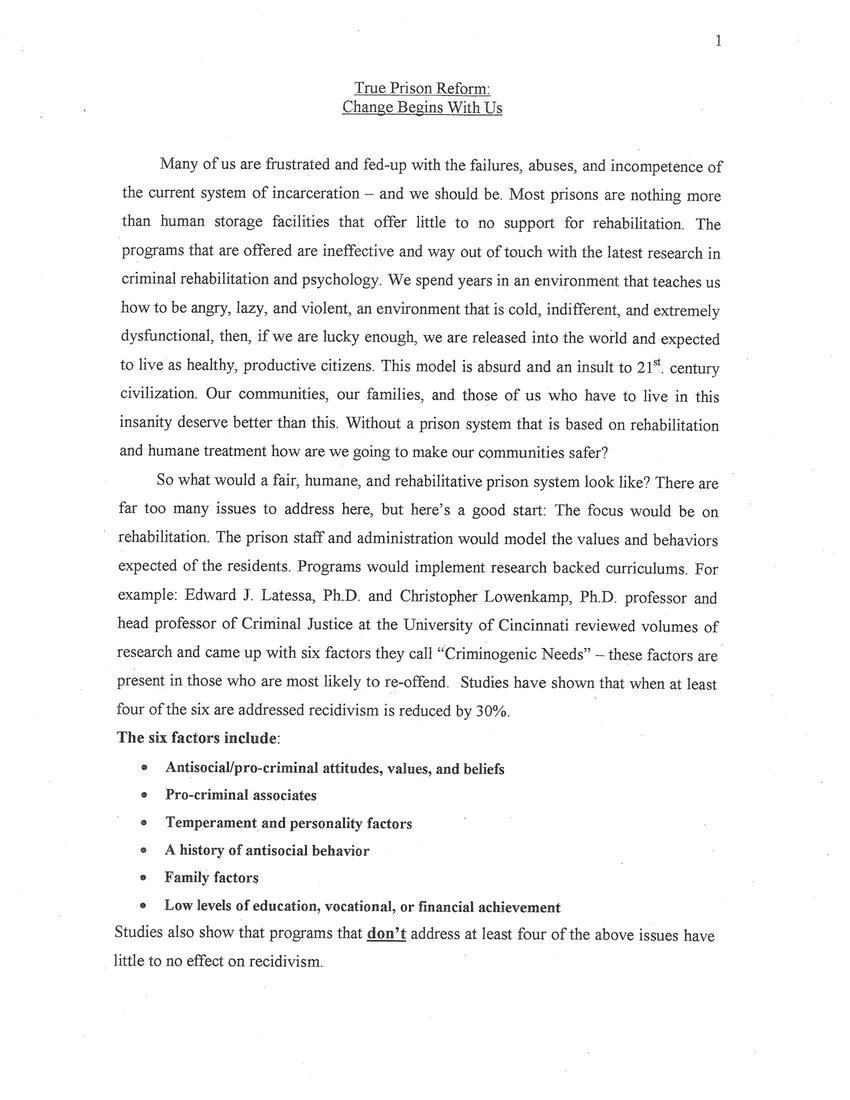
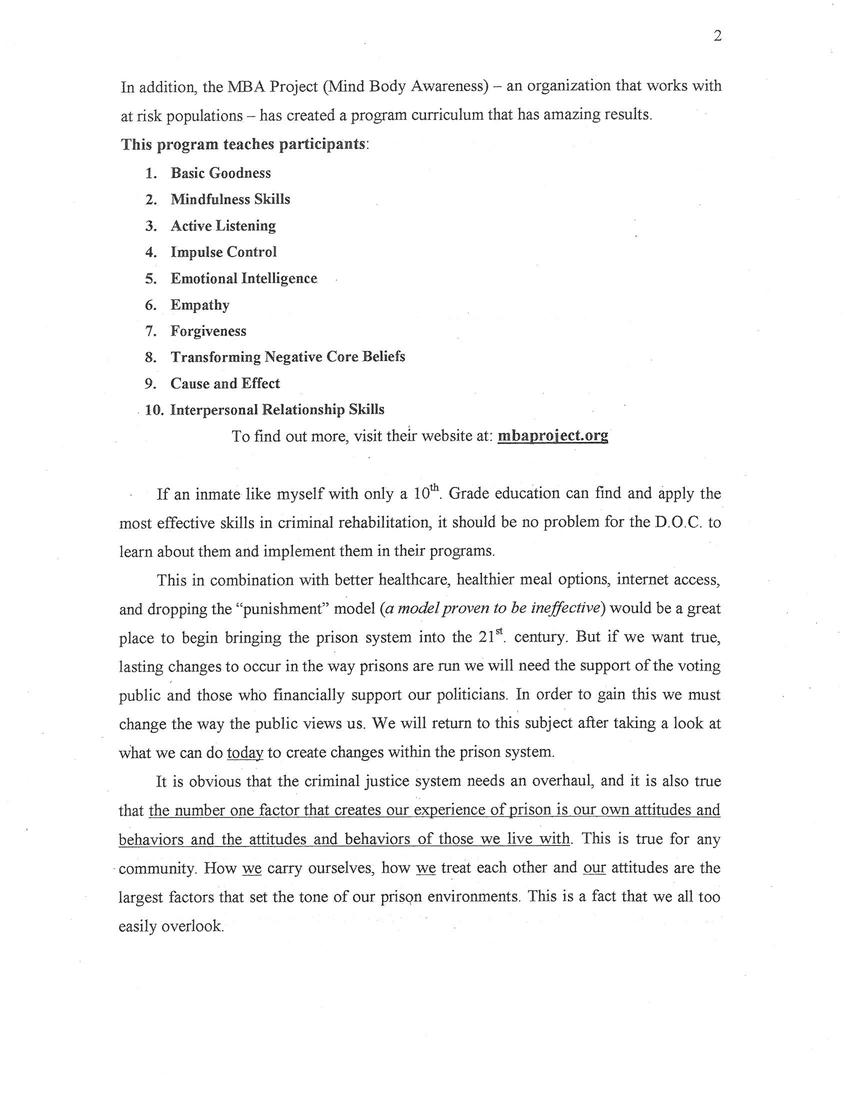
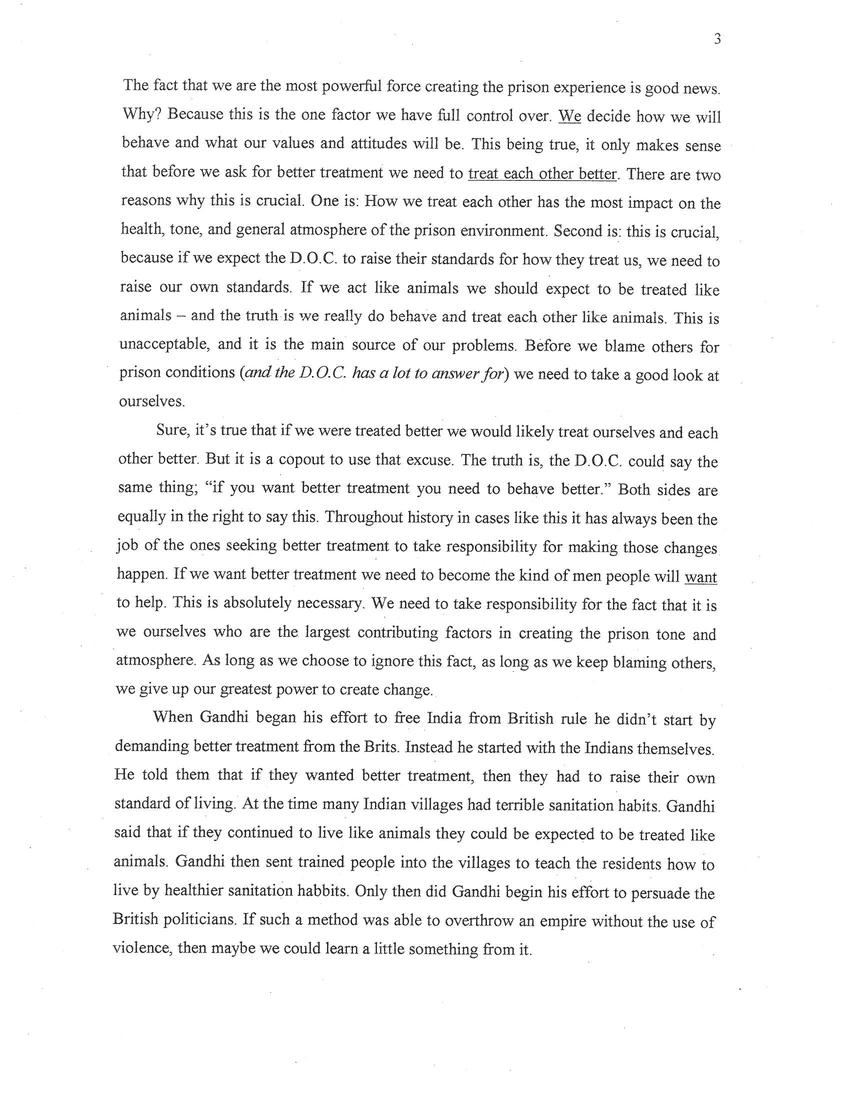
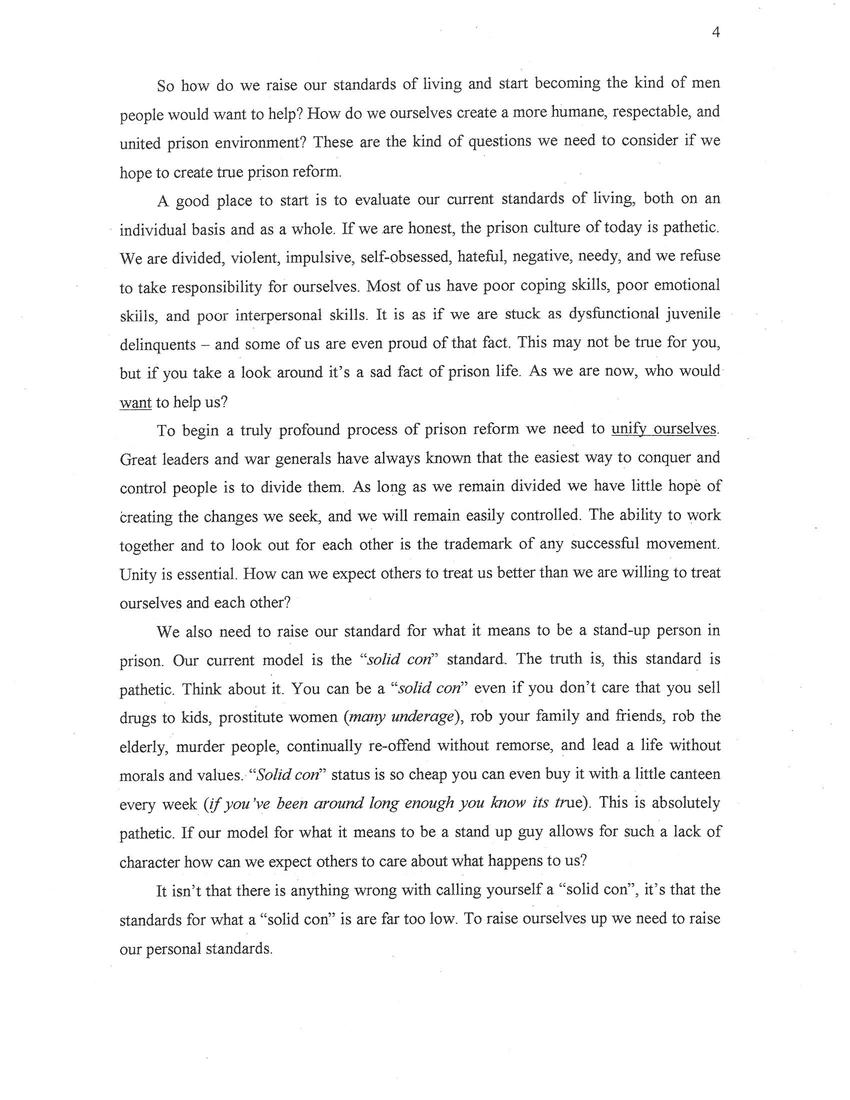
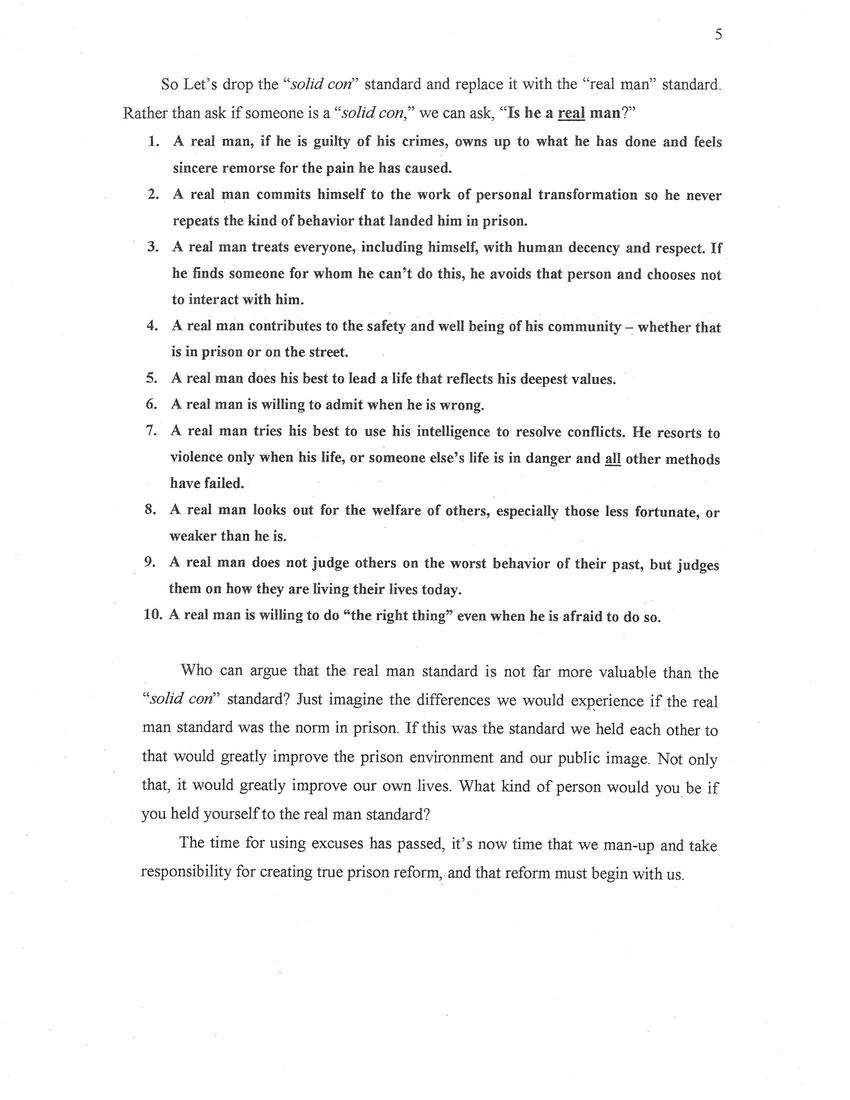
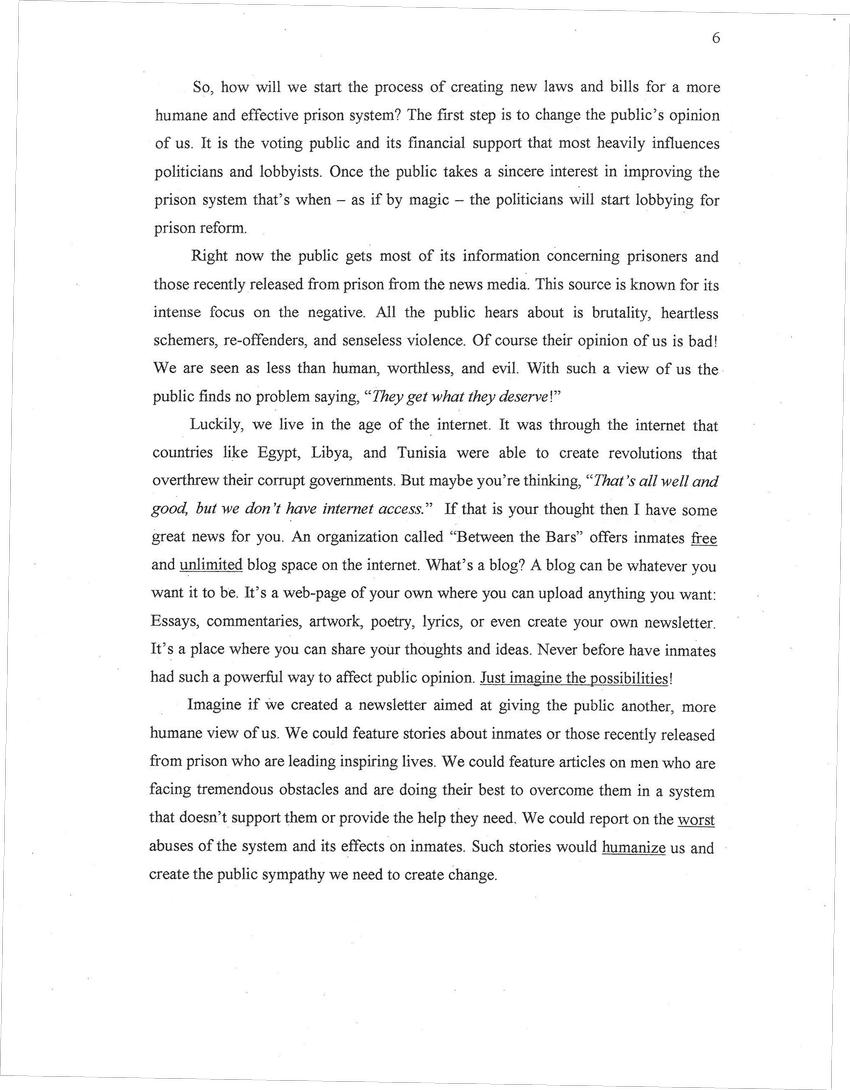
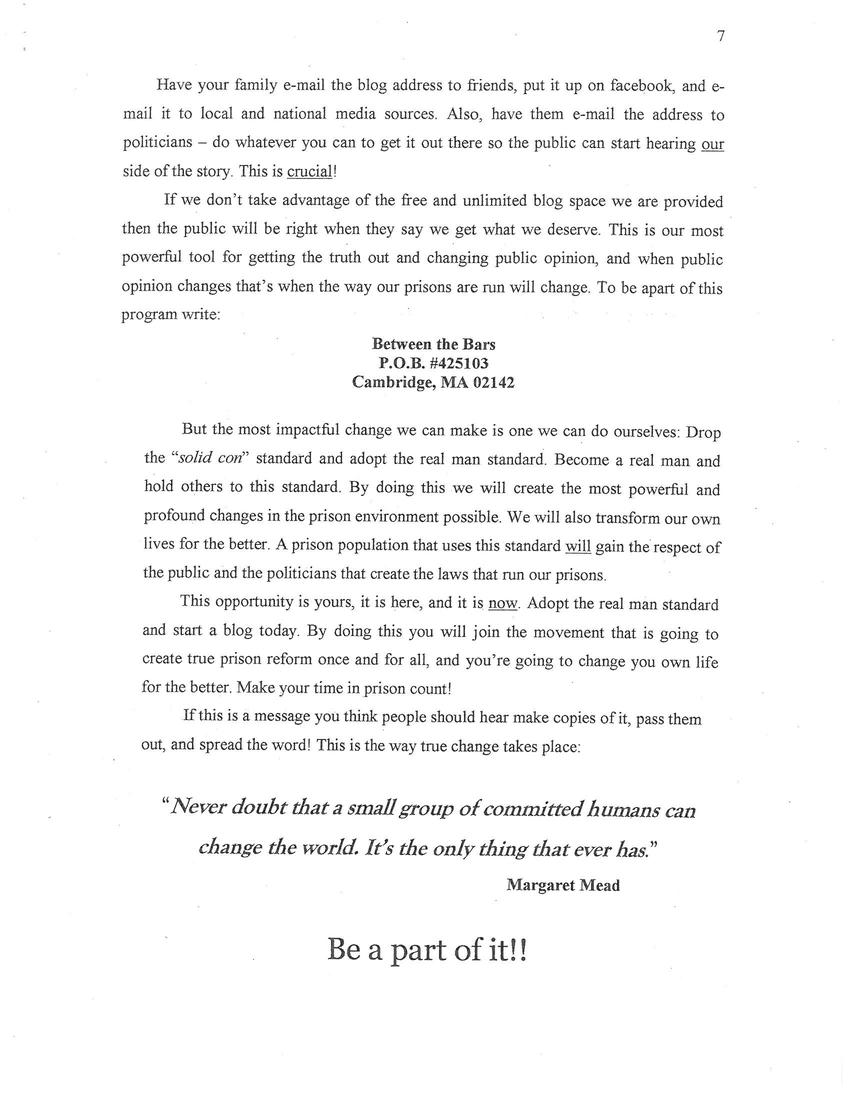


Replies (7)
I often pity the criminals tied up in a corrupt system, but whenever I get on the topic of mistreatment to prisoners with someone I get stone-walled by the opinions of the majority. But, we have to draw the line when corrections officials are commiting crimes in and amongst their daily routines of which the tax payers fund. At that point, shouldn't they assume their positions on the other side of the bars? The country and states have settled on a punishment of incarceration, restricted socialization, and loss of privacy, holidays with families, trips to parks, movies, beaches, etc. These are the punishments correction officers are paid to enforce. No where in the job discription does it say judge the inmates, invent punishments, play favorites, use prisoners for self-gratfication, etc. I've recently learned about the gladiator fights being organized by prison guards in several reformatories. I just couldn't believe it. How far backwards will we be willing to go? The prison employees even place bets. In the days of the original gladiator battles when the fighter earned a victory the retained their lowly gladiator status, but they did get respect, prizes, and privliges. In todays prison-based gladiator battles the victor is awarded with an assault or murder charge. And, the rowdy, place-your-bets fans quickly put their professional masks back on and act as though they are clueless as to why that just happened.
You are right in assuming a more behaved incarcerated population would entice better treatment, but regardless of how inmates behave, the actions of the authorities should never resemble those of the criminals.
Now, to bring up your topic of interest about inmates as a whole behaving like animals, this is what they walked in on when they were admitted, and most people in that situation would react by mimicing the behaviors of the majority because it is the best way to avoid confrontation. And, as for your topic of recidivsm, I think that it occurs so often because of the experiences one has while in prison as well as the fact that in this economy, and with a criminal record, it is often easier to lead a criminal life to obtain your financial needs than it is to go the traditional route. But, like anything, people get greedy and careless, thus recidivism. What would need to occur to promote respectable behavior amongst inmates is a prison-wide pride associated with positive behavior. How much would it blow the gambling guards minds if the rival gang members simply didn't fight. Both would have to want to prove that that is below him and he would have to feel proud about his actions and receive positive feedback from his peers. In my opinion, that is the only way we could get entire prison populations to take part in changing the publics opinion about inmates. And, how likely do you think it is that will occur? Jessica
Your blog post really changed my opinion of prisons an inmates. It seems like you have used your time in prison to reflect on your life and become, by your definition, a "real man". I agree with you when you say that prison reform would involve both prisoners and non-prisoners, and I agree that reforming prison with the MBA project and psychological/rehabilitative research would significantly improve the effectiveness of a prison. You presented your opinion very eloquently in this blog, and you should further publicize the changes that should be made in prisons to the general population. If more people read what you had to say, I think their opinions would change.
Keep writing! :)
I must say that I have never been really inclined to prison culture, however via this blog and your essay I am starting to truly understand prison culture. More specifically how it is crucial to start a change.
Thank you for enlightening me
I teach a class on Leadership skills inside SCI here in Ohio and was looking for a way for these men to make a change for the better inside their institution, and I came across your article.
First of all, well done!!! You speak the truth when it comes to changing the prison environment, especially when it comes to changing the man you were/are. This in itself takes courage. Again, well done!!!!
I have printed out copies of this article for this class and am assigning 2 teams to and then challenging them to change their environment for the better. I am simply asking for your permission to use this article to hopefully encourage new thoughts for these men and to inspire them to become better. I'll write more later, especially when it comes to prison reform.
The "prisons" men and women live in here on the outside are equal to the prison you live in today. Most people hide a sin inside that GOD is aware of that is worse than the crime they committed that put them in their prison, whether it be one of brick and mortar and razor wire or one of walls that can only be seen by the one hiding the sin. May GOD Bless your every endeavor, especially as you go forward, changing lives, one at a time.
Tim